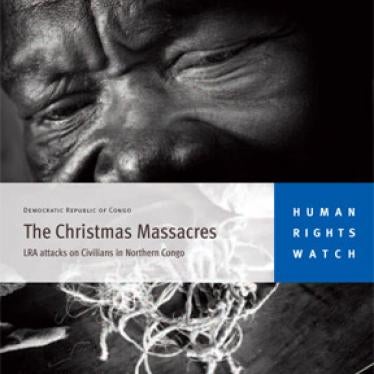On June 11, 2009 the military chiefs of Uganda, Democratic Republic of Congo and Central African Republic met in Kisangani, Congo, to discuss operations against the Lord's Resistance Army (LRA). The brutal Ugandan leaders of the rebel LRA, wanted by the International Criminal Court for crimes against humanity, have killed numerous civilians and abducted thousands of children across four countries over the last two decades. In a climate reported to be both "convivial and fraternal," the military heads concluded that the operations against the LRA were "remarkably successful."
Those military chiefs may be surprised to learn, then, that thousands of young people plan to descend on Washington on June 22 to press the United States to do more to stop the long-running threat posed by the LRA. These young people and the organizations sponsoring them, Resolve Uganda, the ENOUGH project and Invisible Children, know the truth about the past and recent operations against this group: they have not achieved success and the situation isn't getting better.
Last December, Uganda with the support of Congo and Southern Sudan began "Operation Lightning Thunder" to root out the LRA from its Congolese bases. The US provided intelligence, technical and logistical support, including $1 million in fuel and satellite phones, but as is well-known now, the operation ran into difficulties from the start. It was not well-coordinated: the UN peacekeeping force in Congo was kept in the dark. Ugandan aerial attacks failed to locate senior LRA commanders, and the rebels splintered into small groups, committing brutal reprisal attacks on civilians.
Human Rights Watch documented how small groups of the rebels rounded up civilians in several villages and hacked to death entire families as they gathered for their Christmas meal. As we have seen so often before, the military had no plan to protect civilians and could not stop the bloodshed. Conservative estimates of LRA abuses since the Uganda-led operation started include 1,137 civilians killed, 674 abducted, mostly children, and more than 140,000 displaced, often in remote locations hard for aid groups to reach.
The Ugandan-led operation officially ended in March, but Uganda left behind 2000 soldiers for "intelligence purposes." Since then, the Ugandan and Congolese military chiefs have been meeting monthly to evaluate the ongoing operations, which are officially led by the Congolese army. Civilian protection is now the responsibility of poorly equipped Congolese soldiers and overstretched UN peacekeepers. Some rebels have been killed or captured; only one has been brought to face justice in Uganda.
The public relations spin of the Kisangani meeting masks the ongoing bloodshed and the lack of a plan to stop it. It also hides the bitter frustration among those still suffering LRA abuses.The bottom line is that there is little urgency to devote the needed manpower and resources to protect those under threat. The Congolese know that their own army's limitations. On June 8, civilians in the Congolese town of Buta rose up and burned vehicles at a small UN site, enraged by recurring LRA attacks in which one person was killed and 135 people abducted.
There is some room for guarded optimism. The US could take the lead where the Ugandans and others have repeatedly failed. In May, Senators Sam Brownback and Russ Feingold and Representatives Jim McGovern, Brad Miller and Ed Royce introduced bipartisan legislation to require the Obama administration to develop a strategy to support multilateral efforts to protect civilians from the LRA attacks and apprehend its commanders. The June 22 rally in Washington aims to press Congress to pass this legislation.
President Obama's new assistant secretary of state for African affairs, Johnnie Carson, is a former US Ambassador to Uganda who knows both the brutality of the LRA and the Ugandan government's tendency to spin tales to win votes at home. Carson must also know that broader U.S. policy toward Uganda, a zealous partner in the "war on terror," needs serious revamping. President Museveni faces a tough election in 2011 and the domestic political spin will no doubt ratchet up. And as Human Rights Watch has documented, President Museveni's military continue to commit serious human rights abuses against domestic political opponents and alleged terrorism suspects in Uganda, cloaked in the rhetoric of the "war on terror."
Uganda is sensitive to its reputation. It assumes the presidency of the U.N. Security Council on July 1, so this is a prime moment for the US to press President Museveni to acknowledge the failures of the LRA operation and address human rights abuses by the military at home.
US - not Ugandan - leadership is a key component in any multilateral strategy to protect civilians from LRA attacks and to apprehend the groups commanders who are wanted by the ICC. Without constructive and meaningful engagement by the United States and other allies, the LRA will continue to wreak havoc, and regional armies will claim success for domestic political consumption. Civilians in Congo, Central African Republic and Southern Sudan will again be the losers in their leaders' political games.







